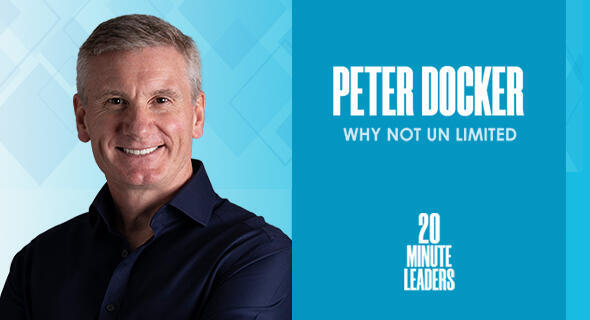Making mistakes is part of growth as a leader. But only if you are curious and self-reflective, says Peter Docker (co-founder of Why Not Un Limited) and author of Leading from the Jumpseat. He shares that curiosity is crucial for leaders to be better listeners. Docker explained that we are often rewarded with knowing the answers. However, leaders need to focus on asking the right questions while allowing others to answer them. This is part of what Docker refers to as humble confidence. It is the combination of confidence in one’s strengths and your destination with the humility to learn from others. Docker states that finding what is important to you can give you the energy and drive to go after the unknown. Docker also believes that leadership is about creating a sense of belonging within your team. This will encourage them to take on more responsibility.
You have dedicated your career to helping others and harnessing their potential. Where did that idea come from?
For many years, it was just something I did, but not that intentionally. It was only later in my life that I had the chance to reflect on the things that didn’t go as well as the good times and to codify them. I have had the chance to travel to 93 countries and have worked with leaders from companies across every sector. My curiosity has informed me about what I consider great leadership and what doesn’t work so well.
Are you more curious about what makes great leadership and what makes it not work as well?
I don’t believe there is a perfect leader. In my book Leading From The Jumpseat, there were times when I was not perfect. It is through making mistakes that we can learn. However, we must remain curious, be reflective, and not focus on the individual data points. Instead, we should be more focused on the overall trends.
Are we sourcing ourselves in a place where there is fear or love? When we source ourselves out of a place that is filled with love, we look at the world as an opportunity and place of possibility. We look for the opportunity to lift others up. This is what I mean by leading with love.
Curiosity, reflection and leadership: When did you realize that these are two essential elements to being a leader?
Listening is a key quality of great leaders, I believe. If you are curious about something, listening properly is possible only if you are interested in it. I have worked with great leaders who were curious about my views and what I can do to help them.
Our entire system is rewarded when we know the answer. Because you are skilled in a particular area, you become a specialist. If you are a leader of many people, you will become the one who knows everything. Because your knowledge is only as good as your team’s.
This is where curiosity comes in and listening is key. Great leaders are not focused on knowing the right answer. They are more focused on asking the important question and feeling confident to take on leadership when they don’t know. You are no longer a pipe. Instead, you’re relying on your team for help and that collective genius to find the answers.
This is something that can be taught or trained, the art of being curious.
Yes, I believe it is. It starts with self reflection. The book begins with self-reflection. I then dive deep into what is most important to me as an individual. Many of us think that family is the most important thing in our lives. However, if we dig deeper, we discover other important things.
My parents lost their jobs and I wanted to be able support them. However, I didn’t want to be a burden. This was the one thing that I found to be extremely important.
It’s important to recognize the most important things because it creates a reservoir of energy that allows you to move forward, even into unknown territory. Let me give an example. My wife called me a few years back to inform me that she had been in a car accident. I gave up everything. I didn’t know what I would discover. I was willing to take a risk and go into the unknown. It was that energy that gave me the drive to support my wife.
This is where the curiosity part comes in. If we are passionate about certain things, the hand rails that guide and guide us, we are more likely to be curious. We want to know as much as possible to solve the problems before us. We can learn to lead with what i call “humble confidence.”
Where can we see this humble confidence today
ASOS is a company. It’s in the fashion retail industry. They are huge. They have over 400,000 products online. The CEO was Nick Beighton until very recently. Nick shows humble confidence.
What is humble confidence? It’s about being confident and resolute in your own strengths, able to communicate clearly with your team and be ready to make decisions. The humble side of you is also important. It’s the ability to be humble and listen to others, even when we don’t have all of the answers. But instead of seeing it as a weakness, see it as a strength.
This is how Nick Beighton transformed it from a small company to a multibillion-dollar corporation. He did this by giving his people the tools and support they needed. This is the essence of what I refer to as “jumpseat leadership”. It’s not about growing or retaining our own power. It’s about lifting up others and empowering them so that when the time is right, you can take the lead.
What is the most difficult part of not having all the power but sharing it with others?
Ego is the greatest challenge. Fear can trigger ego. Fear is triggered by a threat to our lives. Fear can also be triggered by our livelihood, our status, and our reputation being in danger. Fear can also be triggered by one of these factors. Often, the response is ego. We close down. We see the world not as a source of opportunity, but as a source of scarcity. It’s the point at which we stop thinking about others. Fear is not sustainable.
We always have the choice of choosing love or humble confidence. Humility is the antidote for ego. It is sustainable because it comes from a place where there is love. It will keep you going through difficult times.
Can we really expect leadership to evolve? Or are we convergent on the idea that we will continue to use the same principles moving forward?
It might be more refined. The environment can change. The main principles of leadership can change over time. Leadership is based on a clear commitment. A commitment is only a promise we make to ourselves that we will follow through. Then, being humble and able to listen to others.
The last aspect of leadership that I believe is important is to foster a sense of belonging. We want to belong. Leaders who nurture this sense of belonging create an environment in which people are willing to take on more responsibility. They feel connected and they will do more for the cause. This is when leadership truly takes flight. We discover that we really need to be less.
Parenting is one of the most difficult leadership challenges anyone can face. There are many things you don’t know when you first become a parent. But you are determined to raise your children and honor the things you believe are most important. You are willing and able to take on the unknown even if you don’t know the answers. You have the humility to ask others. It’s a commitment that lasts until your death. Great leadership begins at home. These fundamental aspects of leadership remain the same throughout the centuries.
Forbes 30 Under 30 winner Michael Matias is author of Age is Only a Int: Lessons I Learned from Being a Young Entrepreneur. He is currently a Venture Partner at J-Ventures, and he studied Artificial Intelligence at Stanford University. He was also an engineer at Hippo Insurance. Matias was previously an officer in the 8200 division. 20MinuteLeaders is an interview series about tech entrepreneurship featuring one-on-1 interviews with fascinating founders and innovators sharing their journeys and experience.
Contributing editors: Michael Matias, Megan Ryan




